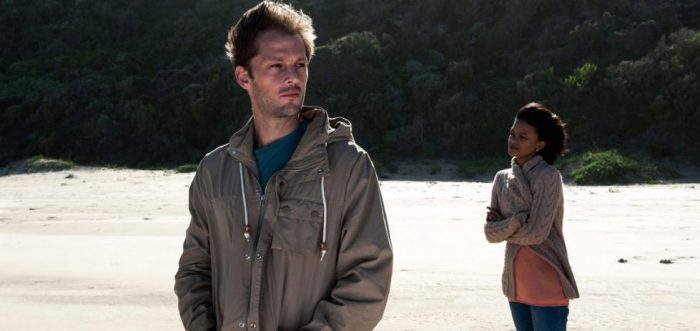
The Endless River is the third film by South African writer-director Oliver Hermanus whose haunting Beauty won him the Queer Palm in 2012. It follows the interweaving stories of outsider Gilles (Nicolas Duvauchelle) and local waitress Tiny (Crystal-Donna Roberts) in the wake of the savage killing of Gilles’ family and the release of Tiny’s husband Percy (Clayton Evertson) from jail.
Resembling a classic Hollywood western, The Endless River’s old timey opening credits roll over panoramas of sweeping landscapes in Riviersonderend, the Western Cape village in which the film takes place, accompanied by Braam du Toit’s intriguing string-based score. It’s as explicit a genre opening as one could imagine (think The Searchers et al), but it stands it pretty stark contrast to the rest of the film, which has a hard time deciding exactly what it wants to be.
Starting as an investigative thriller of sorts, with a mystery surrounding who savagely murdered Gilles’ family, The Endless River transforms rather abruptly into a brooding, romantic road trip in the last third of the film. As the story moves deeper into introspection, it seems to leave aside a lot of the interesting questions about racial tension and police discrimination that it poses early on. To justify this, Hermanus divides the film into three chapters, named after Gilles, Percy and Tiny, but the perspectives of each are scattered throughout, and Percy is more of a catalyst than a developed character, so it comes off as a mostly superficial decision.
The Endless River is all about what’s implied rather than what’s necessarily shown or heard. A lot of the film’s key action occurs off screen, with the exception of the brutal home invasion, and character interactions seem laden with unspoken truths. All that is fine in theory, but here it’s at the expense of character development. The trap of stripping down scenes to ominous, minimalistic conversations is that you can lose some of the psychology of the character’s emotions. In this case, both players’ motivations seemed arbitrary and their romance comes off as undercooked.
The Endless River has a lot of separate parts that don’t necessarily cohere. The various events that set the film in motion, while speaking to the deep-seated racial tensions that plague South Africa, are quite convoluted and involve some inexplicably hopeless police work from the local inspector (Darren Klefkens). Structurally, the story seems unfocused and as Hermanus moves towards melodrama, the film seems to lose its larger societal stakes.
Though it will no doubt be polarising, the home invasion scene early on is well executed. It is such a distressing, brutal scene, and the elongated tracking shots that hover around the house work well in combination with du Toit’s teasing symphonic score. The scene could be bordering on tastelessly graphic—the rape scene is confronting; exercise caution—but it appropriately represents the scale of the gang violence in the area.
The performances are mixed. Nicolas Duvauchelle is physically impressive, inhabiting the exhaustion and confusion that come with grief, but his line delivery is too grandiose. Crystal-Donna Roberts as Tiny is the strongest performer, capturing a similar sense of remorse in more nuanced fashion.
Stylistically, the film is quite distinct. Chris Lotz’ cinematography is fantastic, effectively juxtaposing these two self-contained figures against the prodigious natural beauties of South Africa. Yet at a certain point it becomes difficult to read much more into this film beyond the impressive cinematography. The Endless River isn’t a bad film by any measure, but it just doesn’t seem interested in engaging with the complex social and political issues that should really saturate it, instead revolving around an underdeveloped romance and finishing on a needlessly open ending.
